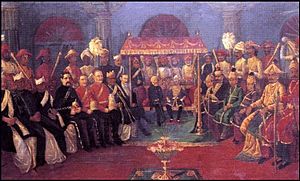Maharaja facts for kids
The word Maharaja (pronounced Mah-hah-RAH-jah) comes from the ancient Sanskrit language. It means "great king" or "high king." This special title was mainly used for Hindu rulers in India and other parts of Asia. Many Indian languages, like Punjabi, Bengali, Hindi, and Gujarati, use this word.
If a female ruler held this high position, she was called a Maharani (pronounced Mah-hah-RAH-nee). This title also meant "great queen." A Maharani could be the wife of a Maharaja, or she could be a powerful ruler herself.
In 1971, the government of Indira Gandhi in India decided to stop using these royal titles. They also ended the special payments given to these rulers. However, some families still use these titles as a way to remember their history.
Kings and Queens in India
Before India became independent in 1947, it was made up of many smaller kingdoms. These were called princely states. There were more than 600 of these states, and each one had its own ruler.
Different Royal Titles
Rulers in these states used different titles depending on their religion or region:
- If the ruler was Hindu, they might be called a Raja or a Thakur.
- If the ruler was Muslim, they were often called a Nawab.
There were many other royal titles too, showing the rich history of India's kingdoms.
Images for kids
-
Chamarajendra Wadiyar X, the Maharaja of Mysore (1885)
-
Maharaja Jaswant Singh II of Marwar, c. 1880. Attributed to Narsingh. The Brooklyn Museum.
-
Chhatrapati Shivaji Raje Bhosale. This Maratha king preferred the title of Chhatrapati over Maharaja. He founded and ruled the Maratha Empire of India.
-
Sri Panch Bada Mahārājādhirāja Prithvi Narayan Shah Dev of Nepal.
-
Maha Vajiralongkorn Bodindradebayavarangkun, King of Thailand (2016–)
-
Chithira Thirunal Balarama Varma, the Maharaja of Travancore
-
Maharaja Duleep Singh, the last Maharaja of the Sikh Empire.
-
Maharaja Vikram Dev III of Jeypore Samasthanam Estate, Kalinga.
-
Krishnaraja Wadiyar IV, the Maharaja of Mysore
See also
 In Spanish: Maharajá para niños
In Spanish: Maharajá para niños
 | Victor J. Glover |
 | Yvonne Cagle |
 | Jeanette Epps |
 | Bernard A. Harris Jr. |

















